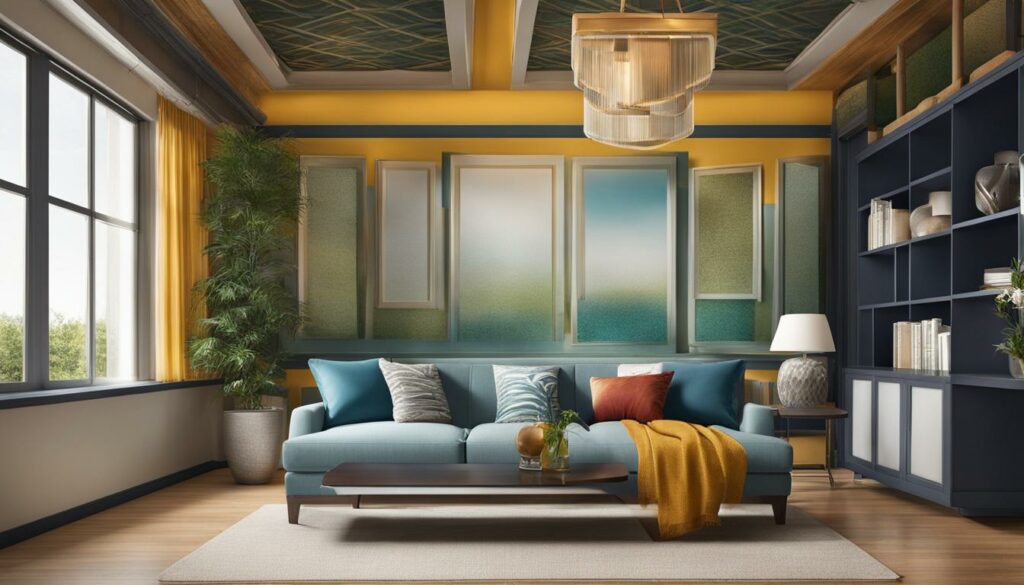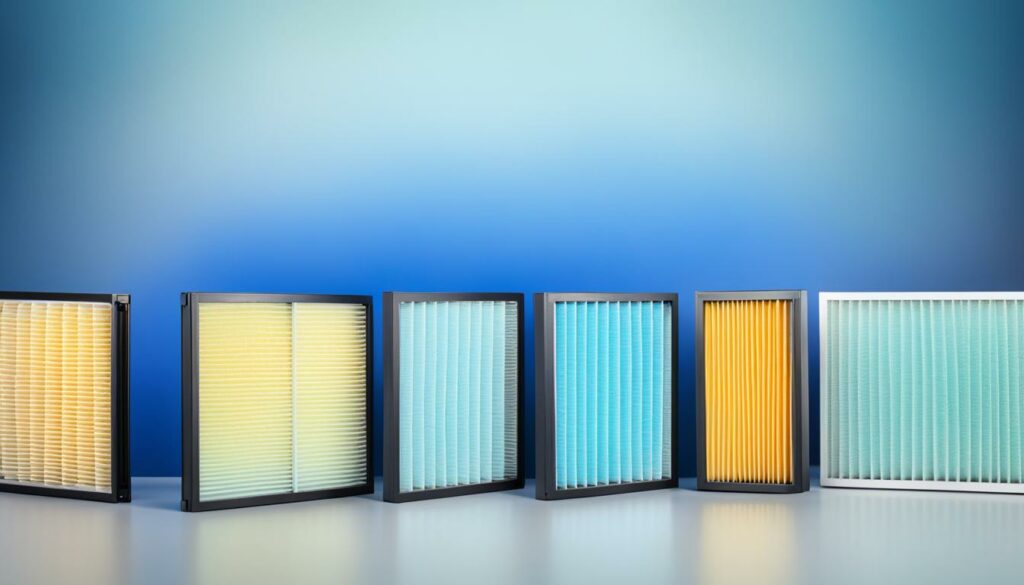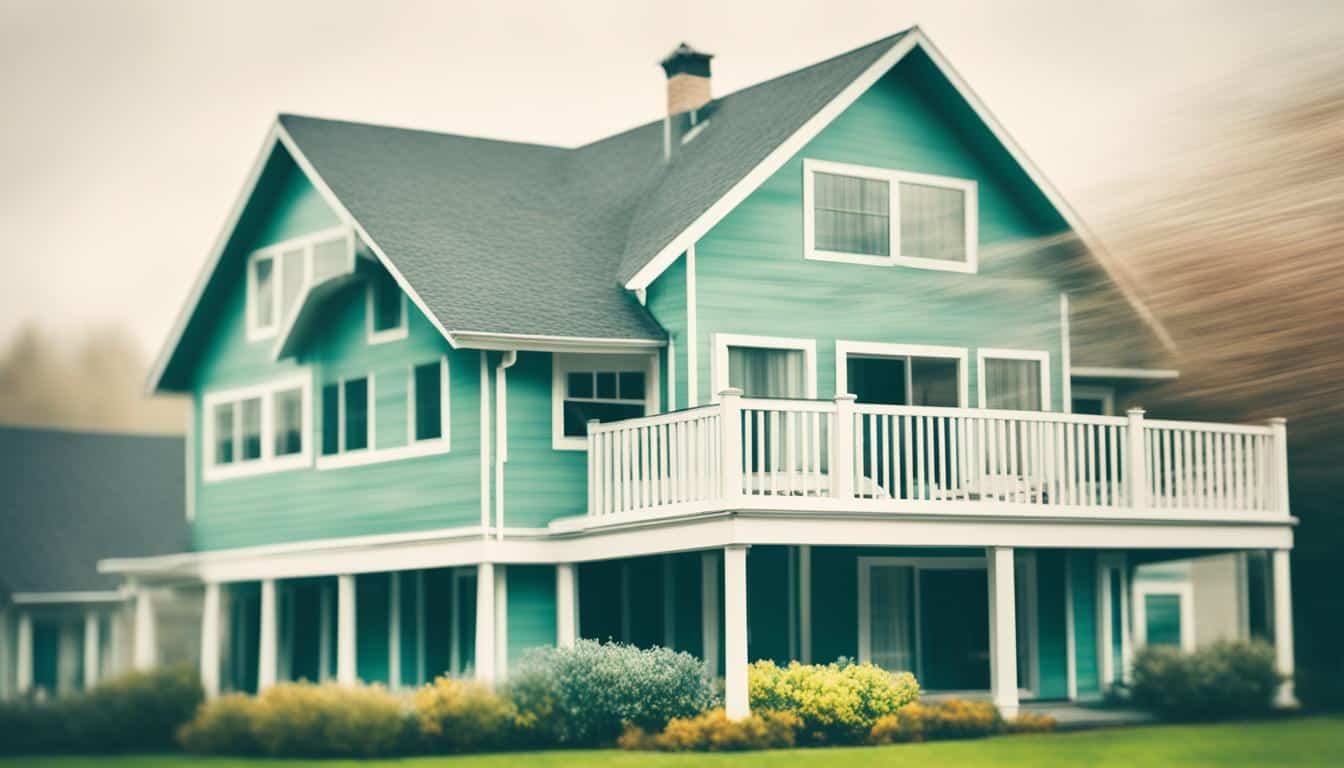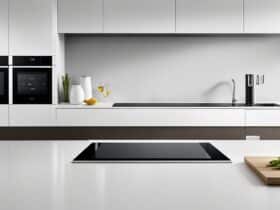Determining the right number of air filters for your home is crucial for maintaining indoor air quality and optimizing the performance of your HVAC system. Air filters protect both the system and occupants from particles and pollutants. Different factors, such as home size, HVAC system type, the presence of pets or smokers, and individual air quality needs, influence the number of filters needed in a house.
Key Takeaways:
- The number of air filters needed in a home depends on factors like home size, HVAC system type, and individual air quality needs.
- Air filters play a critical role in improving indoor air quality and protecting the HVAC system.
- Factors such as allergies, pets, and environmental conditions should be considered when calculating the quantity of air filters required.
- Regular inspection and replacement of air filters are essential for optimal performance and air quality.
- Selecting the appropriate number and type of air filters helps maintain clean and healthy air circulation while maximizing energy efficiency.
Understanding the Importance of Air Filters in Your Home
Air filters are a crucial component in maintaining good indoor air quality and ensuring the health and comfort of the occupants. They serve as a barrier, blocking dust, debris, and other particles from entering the HVAC system, while also trapping harmful pollutants and contaminants that could negatively impact the air you breathe.
The primary purpose of air filters is to promote clean air circulation throughout your home. They remove airborne particles such as pet dander, pollen, mold spores, and dust mites, which can trigger allergies and respiratory issues. By capturing these particles, air filters help create a healthier environment for you and your family.
The effectiveness of air filters is measured by their Minimum Efficiency Reporting Value (MERV) rating. The MERV rating indicates the filter’s ability to capture particles of different sizes. Filters with higher MERV ratings can efficiently trap smaller particles, ensuring cleaner air.
Choosing air filters with the right MERV rating is key in maintaining a balance between air quality and HVAC system efficiency. Higher-rated filters may provide better filtration but can restrict airflow, potentially burdening the HVAC system. On the other hand, lower-rated filters may allow for better airflow but may not capture smaller particles as effectively.
When selecting air filters for your home, it’s essential to consider your specific indoor air quality needs, as well as the compatibility with your HVAC system. Properly matching the MERV rating of the filter to your unique requirements can help optimize filtration without straining the system.
Understanding the vital role that air filters play in maintaining a healthy and comfortable living environment is crucial. By regularly inspecting and replacing air filters with the appropriate MERV rating, you can ensure optimal indoor air quality while safeguarding the longevity and efficiency of your HVAC system.
Benefits of Air Filters:
- Improved indoor air quality
- Reduced allergens and pollutants
- Protection for HVAC system components
- Enhanced respiratory health
- Reduced dust accumulation
| Air Filter Type | MERV Rating | Particle Capture Efficiency |
|---|---|---|
| Fiberglass Filters | 2-4 | Basic protection against larger particles |
| Pleated Filters | 5-13 | Good filtration of smaller particles, including mold spores and mite debris |
| HEPA Filters | 14-16 | Highly efficient filtration of microscopic particles, such as bacteria and viruses |
Assessing Your Home’s Airflow
Understanding your home’s airflow is crucial when determining the number of air filters needed. Factors such as room size, ventilation needs, and the overall design of the HVAC system influence airflow and filtration requirements.
Measuring the square footage of each room, considering the recommended air changes per hour (ACH), and assessing the location of air intakes and outputs are essential for calculating the proper number of filters. Additionally, knowing the capacity of the HVAC system in cubic feet per minute (CFM) helps determine the number of filters required.
By accurately assessing your home’s airflow, you can ensure optimal air quality and maximize the efficiency of your HVAC system.

Factors Affecting Home Airflow
| Factors | Impact on Airflow |
|---|---|
| Room Size | A larger room may require additional air intakes and outputs for proper airflow. |
| Ventilation Needs | Rooms with higher ventilation requirements, such as kitchens or bathrooms, may need more air circulation. |
| HVAC System Design | The overall layout and configuration of the HVAC system can affect how air is distributed throughout the home. |
Assessing these factors will help you determine the optimal number of air filters needed to maintain a healthy and comfortable indoor environment.
Types of Air Filters and Their Effectiveness
When it comes to air filters, there are several types to choose from, each with its own level of effectiveness. Understanding the different options available can help you select the right filter for your home and ensure cleaner indoor air quality. Here are the main types of air filters:
Fiberglass Filters
Fiberglass filters are the most common and cost-effective option. They are designed to provide basic protection by capturing larger particles such as dust, pet dander, and lint. These filters typically have lower Minimum Efficiency Reporting Value (MERV) ratings, ranging from 1 to 4.
Pleated Filters
Pleated filters offer better filtration and are available in various MERV ratings, typically ranging from 8 to 13. The pleats increase the filter surface area, allowing better capture of smaller particles like mold spores, pollen, and mite debris. These filters are an excellent choice for those with allergies or respiratory conditions.
HEPA Filters
HEPA (High-Efficiency Particulate Air) filters are the most effective at capturing microscopic particles, including bacteria, viruses, and allergens. They have the highest MERV ratings, typically ranging from 17 to 20. HEPA filters are often used in medical facilities and in homes where air quality is a top priority.
It’s important to strike a balance between air quality and airflow when choosing an air filter for your home. While HEPA filters offer exceptional filtration, they can restrict airflow if used in systems not designed for them. Consider your specific air quality needs, allergies or respiratory conditions, and the recommendations of your HVAC system manufacturer when selecting the right air filter type.

Determining the Proper Number of Air Filters for Your Home
The number of air filters required for a home depends on several factors, including the home size, the number of HVAC systems, and the presence of air return vents. To ensure optimal air quality and system performance, it’s important to determine the right number of air filters for your specific needs.
Home Size and Square Footage
One of the key factors in determining the number of air filters is the size of your home. The square footage plays a significant role as it directly impacts the airflow and air circulation throughout the space. Larger homes generally require more air filters to adequately filter the air.
Number of HVAC Systems
If your home has multiple HVAC systems, it’s crucial to have one air filter per system. Each system has its own intake and separate airflow, requiring individual air filters to ensure efficient filtration.
Air Return Vents
The presence of air return vents also plays a role in the number of air filters needed. Air return vents serve as the entry points for air to circulate back to the HVAC system for cooling or heating. If your home has multiple air return vents, it’s recommended to have an air filter at each vent to capture dirt, dust, and other particles before they reach the system.
Considering these factors and guidelines, a general recommendation for an average-sized home is to have one air filter per HVAC system. However, it’s important to note that individual circumstances may require additional air filters or higher MERV ratings. Lifestyle factors such as allergies, the presence of pets, and exposure to pollutants should be taken into account.
Regular inspection of the air filters and monitoring of air quality can help determine if adjustments in filter count or replacement frequency are necessary. By ensuring the proper number of air filters in your home, you can maintain clean and healthy indoor air while optimizing the performance of your HVAC system.
| Factors | Recommendations |
|---|---|
| Home Size | Determine the square footage of your home and consider additional filters for larger houses. |
| Number of HVAC Systems | Have one air filter per HVAC system installed in your home. |
| Air Return Vents | Place an air filter at each air return vent to capture particles before reaching the HVAC system. |
| Lifestyle Factors | Take into account allergies, pets, and exposure to pollutants to determine if additional filters or higher MERV ratings are needed. |
Factors to Consider When Calculating the Number of Air Filters
When determining the optimal number of air filters for your home, several factors come into play. The size and layout of your house, including ceiling height and room sizes, directly influence the requirements for air filtration. Additionally, the type of HVAC system installed in your home plays a significant role, as different systems have specific filter compatibility.
It is also essential to consider specific considerations such as allergies and asthma, pets, and smokers. Allergies and asthma can significantly impact indoor air quality, requiring additional filters to reduce allergens and irritants. Likewise, households with pets and smokers may need extra air filters to manage pet dander and tobacco smoke.
Moreover, environmental factors should not be overlooked when calculating the number of air filters needed. High levels of pollution in your area or specific seasons that aggravate allergies and air quality issues may require additional filters to maintain optimal indoor air quality.
By taking these factors into account, you can determine the appropriate quantity and type of air filters to ensure clean and healthy air circulation throughout your home.
Factors Affecting Air Filter Calculation
- House size and layout
- HVAC system compatibility
- Allergies and asthma
- Pets and smokers
- Environmental factors
“Choosing the right number of air filters for your home is essential for maintaining optimal indoor air quality. Factors such as house size and layout, HVAC system compatibility, allergies and asthma, pets and smokers, and environmental factors play a crucial role in determining the quantity and type of air filters required.”
| Factors to Consider | Effect on Air Filter Calculation |
|---|---|
| House size and layout | Influence air filtration requirements |
| HVAC system compatibility | Different systems have specific filter requirements |
| Allergies and asthma | Additional filters may be needed to reduce allergens |
| Pets and smokers | Extra filters manage pet dander and tobacco smoke |
| Environmental factors | High pollution levels or specific seasons may require additional filters |
Conclusion
Determining the proper number of air filters for your home is an essential step in maintaining good indoor air quality and maximizing the efficiency of your HVAC system. By carefully considering factors such as the size of your home, the type of HVAC system you have, your lifestyle needs, and environmental factors, you can make informed decisions about air filter selection.
Choosing the right number and type of air filters will ensure clean and healthy air circulation throughout your home while optimizing energy efficiency. Regular inspection and replacement of air filters are important maintenance tasks that help maintain optimal indoor air quality and protect your HVAC system from damage.
Remember, the air filters in your home act as the first line of defense against dust, pollen, pet dander, and other airborne particles. By investing the time and effort in selecting the appropriate air filters for your specific needs, you can create a healthier and more comfortable living environment for you and your family.
FAQ
How many air filters does a house have?
The number of air filters in a house depends on factors such as home size, the number of HVAC systems, and the presence of air return vents.
What is the importance of air filters in your home?
Air filters play a critical role in improving indoor air quality and maintaining the health and comfort of occupants. They protect the HVAC system and ensure clean air circulation.
How can I assess my home’s airflow?
Understanding your home’s airflow is crucial when determining the number of air filters needed. Factors such as room size, ventilation needs, and the overall design of the HVAC system influence airflow and filtration requirements.
What are the different types of air filters and their effectiveness?
There are different types of air filters available, including fiberglass filters, pleated filters, and HEPA filters. Each type has varying levels of effectiveness in trapping particles of different sizes.
How do I determine the proper number of air filters for my home?
For an average-sized home, it is generally recommended to have one air filter per HVAC system. Counting the number of air return vents and considering lifestyle factors such as allergies, pets, and pollutants can help determine if additional filters or higher MERV ratings are needed.
What factors should I consider when calculating the number of air filters for my home?
Several factors impact the number of air filters needed in a home, including house size and layout, HVAC system compatibility, allergies and asthma, pets and smokers, and environmental factors like pollution levels.
How do air filters contribute to indoor air quality and HVAC system efficiency?
Air filters improve indoor air quality by blocking dust and debris and trapping particles. Selecting air filters with the right MERV rating is essential for achieving a balance between air quality and HVAC system efficiency.







